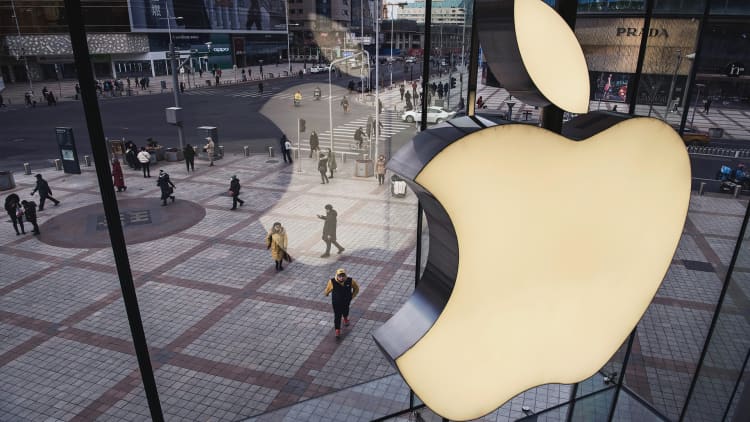China's mobile phone market suffered its worst month in years as device shipments plunged, with the data potentially highlighting further signs of pain for Apple in the world's largest smartphone market.
Mobile phone shipments in China totaled 14.51 million in February, a nearly 20 percent year-on-year fall, according to data released Tuesday by the China Academy of Information and Communications Technology.
Shipments of smartphones specifically totaled 13.8 million, a fall of over 20 percent year-on-year, according to CAICT, a government-backed research institute.
February is typically weak for smartphone sales in China because of a the week-long Chinese New Year public holiday and the fact that new phones are released toward the back-end of the month. But February 2019 was the worst month for shipments going back to at least 2013, according to publicly available data from CAICT.
What happened?
As well as the public holiday, Xi Wang, a Beijing-based China senior market analyst for IDC told CNBC that a number of factors including an economic slowdown in the world's second-largest economy, a saturated smartphone market and retailers having excess inventory all played a part in February's poor performance.
Wang explained that smartphone vendors may ship a high number of smartphones to retailers in January, which exceeds demand, in order to get a "good start" to the year. They will then slow down shipments in February, leaving retailers with lots of inventory.
But beyond those seasonal trends, bigger themes are at play.
"I think there is a lack of revolution in products. Mere evolution is not enough, and now prices are too high, and life cycles are extended because existing technology is good enough. People aren't waiting for the next releases — they are tired of the options," Neil Campling, head of technology, media and telecommunications research at Mirabaud Securities, told CNBC.
"We are waiting for the next big thing — but there are no clear signs yet of what that could be," he said, adding that the foldable phones recently announced by the likes of Huawei and Samsung will remain "niche" for now.
Apple one of the 'biggest losers'
Analysts said Apple's tough time in China, one of its most significant markets, is likely to have continued at the start of the year.
In its fiscal 2019 first quarter that ended Dec. 29, 2018, Apple's Greater China revenue fell nearly 27 percent year-on-year. And in January, major retailers slashed the price of iPhones in China.
Other indicators could point to iPhone weakness in China. The number of searches for iPhone on Chinese search engine Baidu dropped 48 percent in February, marking the fifth consecutive month of decline, according to Longbow Research. The firm argues that iPhone search trends on Baidu are indicative of demand in the China.
Analysts said that Apple was likely to have felt the pain of a slowing overall market, and low-cost rival Xiaomi could also suffer amid stiffer competition.
"Apple and Xiaomi continue to be the biggest losers whereas Huawei, Vivo and OPPO continue to grab more share away," Neil Shah, research director at Counterpoint Research, told CNBC.
"The China market has become a zero sum game with replacement rates becoming slower in the premium end of the market and most folks are not upgrading their expensive and durable smartphones. Most of the growth is coming from mid-tier of the market where Huawei's Honor brand, Nova series, and Oppo's A series is doing quite well and affecting Xiaomi," he added.
In response to an inquiry from CNBC, Xiaomi said it had "updated its multi-brand strategy in January," and that its "shipments of Redmi Note 7, the first product launched following the new strategy, exceeded 1 million units within one month, consolidating our leading position in the smartphone markets."
Apple was not immediately available for comment when contacted by CNBC.

Correction: This article has been updated to reflect that the China Academy of Information and Communications Technology released its latest batch of phone data on Tuesday.


